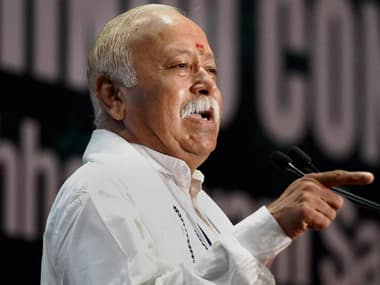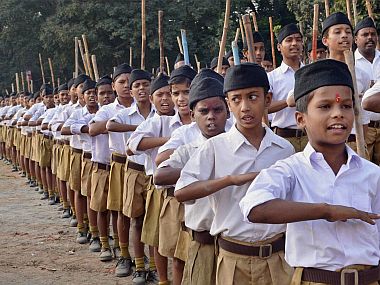The unending beef controversies, especially the tendency of Sangh Parivar loudmouths to talk nonsense and embarrass the Narendra Modi government, show where the real problem lies: an unreformed and illiberal Sangh is a threat not only to the BJP government at the centre but its own longevity. It does not matter what you think about cow slaughter or the consumption of beef - in a world where veganism is becoming chic, it is possible to logically argue the anti-beef case - but it does matter if you feel the need to impose your views on the rest of the world, even by violent action when words do not suffice. If, as one _Panchajanya_ article reportedly argued, the Vedas prescribed death for cow slaughter, this fact cannot be used to condone or mitigate any call for murder today. [caption id=“attachment_2474054” align=“alignleft” width=“380”]  RSS cadres in Jharkhand on Sunday. PTI image[/caption] The Sangh may have a chip on its shoulder – sometimes with good reason - about rootless secularists and their anti-Hindu biases, but it will lose the argument if it does not liberate itself from the clutches of a reactionary and un-modern agenda. You can be justifiably proud of your Hindu heritage and still be modern enough to make your case rationally and sensibly. You can revere the Vedas without necessarily using every word in it as divinely ordained. To use the thoughts of the Vedas or the Gita unthinkingly is akin to doing these holy books a disservice. The question the Rashtriya Swayamsevak Sangh (RSS), the BJP’s ideological mentor, must ask itself is not how proud Indians must be of their heritage, but whether they - and modern day defenders of Hinduism - are worthy successors of that heritage. The creators of the Vedas and Upanishads were the noblest thinkers of their time; there can be doubts over whether today’s defenders of Vedas have an ounce of their high-thinking abilities. The problem for the BJP is that it both needs the RSS and is constrained by the connection. Apart from foot soldiers to help it with elections, the RSS is the reason for the BJP’s existence, and so disowning it will do it no good. The BJP’s brand salience comes from the perception that it is a Hindu party – or at least not an anti-Hindu platform. So asking it to ditch the RSS – as some intellectuals are wont to do - is not only a tall order, but pointless. You don’t disown your roots. However, this also creates a problem for the Modi government. What seemed like stray voices of the fringe now sounds like the mainstream in Sangh politics. One could dismiss assorted illiberal voices from the VHP or the Bajrang Dal as unrepresentative of the BJP’s own attitudes, but can it be easy for the Modi government to disown a Sakshi Maharaj, a Sadhvi Niranjan Jyoti, a Yogi Adityanath or – for that matter – a Haryana Chief Minister who manages to say something controversial about beef or women every other day? These are not fringe. These are the core of the BJP and the Sangh Parivar they come from. It will do no good for the party chief of even Modi himself to give the recalcitrants an occasional tongue-lashing for over-the-top comments that damage the party.They can only be reined in if the ideological fountainhead changes its way of thinking. The organisation that really needs to embrace change is the RSS itself. It can, in fact, learn from its own history. The Sangh was started by KB Hedgewar in 1925, possibly in response to real or imagined threats from the creation of a Muslim League that was formed 19 years before that. But the old Sangh was young in ideas and ideals - it saw man-making and building character as its prime purpose. Even if you disagree with the purpose for which the RSS was set up, the fact remains that it had youthful energy in its early years under both Hedgewar and Guru Golwalkar, its second chief. It is not clear what the RSS thinks its purpose is today. Daily exercises and practicing self-defence with lathis may have made sense 90 years ago, but does that make sense today? A key reason for the organisation’s relative decay – despite numerical growth – is its leadership’s age structure. Consider these facts: Hedgewar started the Sangh at a still youthful 36 years of age. His successor, Golwalkar was 34 when he took over. But after that the age profile of RSS Sarsanghchalaks has been rising steadily towards gerontocracy. [caption id=“attachment_2474068” align=“alignleft” width=“380”]  Mohan Bhagwat, the current head of the RSS. PTI image[/caption] Balasaheb Deoras became boss after Golwalkar when he was 58; his successor Rajju Bhaiya was 72 when he took over in 1994. KS Sudarshan was 69 when he got the job in 2000; Mohan Bhagwat, the current chief who took over in 2009, is 65 today. As opposed to this, consider India’s age demographics: 46 percent of Indians are below 24 years of age; over 90 percent of Indians are below Bhagwat’s age. There is no doubt in my mind that an RSS chief in his 40s would be vastly more in tune with today’s youth than someone in his mid-sixties. This is not to confuse chronological age with old attitudes – you can be 65 and still young in thought, and Modi is one clear example of chronological age not representing shopworn ideas – but when an entire leadership is of that kind of age, it is unlikely to be in tune with where the country is heading. Today’s young, especially the generation born after economic liberalisation in 1991, has different ideas about India. They do not lack reverence for the past, but they don’t want to be mired in it. They want to look ahead, with optimism and aspiration. Beef is not on top of their minds, even though they may be loath to consume it. Also, the Sangh is almost entirely a patriarchy, often spouting misogynist talk. If the RSS wants to grow, its leadership must have women in the organisation and at the top, not just ageing men. Sealing women hermetically in a Durga Vahini is not good enough for today’s age. The RSS leadership, apart from its surfeit of gerontocrats, clearly needs a reality check on young India. In an earlier article, this writer had provided a checklist for the RSS to see if it has a future (I reproduce them here in a modified form). One, if its goal is serving Hindu society, should its agenda not include a very strong and explicit social component – like eliminating caste injustices or seeking broader inclusiveness and improved well-being of the people? This has to be top of the agenda, not somewhere at the bottom. Two, even if its goal in only to serve Hindu society, how can this be done if it has an antagonistic attitude to Muslims? Is Hindu society served by making it fight Muslims, or by opening a dialogue with them? Three, more important, the RSS must seek answers to the question of who or what is a Hindu. The term has two connotations – one is the religious one, where anyone who adopts Hindu forms of worship in a Hindu; the other is cultural, where anyone imbued with aspects of Indian culture is a Hindu. But, equally, it makes no sense insisting that Muslims – whether converted ages ago from Hinduism or born as Muslims who settled in India – must term themselves cultural Hindus. Everyone has the right to self-definition, and the RSS should not insist on meaningless shows of Hindu-ness - even culturally. Four, the RSS has to sort out what from history is relevant to modernity and what is not. It has to decide what is truly valuable to its Hindu heritage, and what is not. And what is valuable can always be adapted to modernity. While it is in this area, it is worth asking itself: is building a temple in Ayodhya more important than merely getting Muslim society to accept the reality that Islamic rulers in the past did damage to many Hindu temples and icons? The former is an attempt to humiliate Muslims in India today; the latter is about truth and reconciliation. Even if Babar had demolished a temple to build the Babri, you can’t correct a historical wrong by demolishing a mosque today. Today’s Muslims were not responsible for Babar’s or Mir Baqi’s wrongs. Five, the RSS has to accept the reality that there will be competition in the religious space. So if other religions are going to poach for marketshare in India, it has to gear up for the same by building long-term institutions like the Catholic Church. Banning conversions or seeking restrictions on missionaries is an acceptance of defeat. If the RSS truly believes in the values embedded in Hinduism, it has to accept the challenge and prepare for the long-term. Six, the RSS needs to start valuing intellectualism. The long-term future of any ideology depends on the intellectual input that a group can generate and sustain. The Left, despite being authoritarian and anti-intellectual in politics (Mao, Stalin, and our own Prakash Karat), has managed to dominate the intellectual space and academia in India and abroad for nearly two centuries. On the other hand, the RSS is suspicious of free-thinking intellectuals in the Hindu space. In fact, over the last half-century, I have seen only two persons – Arun Shourie and Rajiv Malhotra – emerge as true intellectuals in the Hindu space. (Though I must acknowledge there must be hundreds of unsung heroes here.) And the RSS has been unable to use them or grow new ones. The RSS cannot have a future without creating a solid intellectual base for growth. Seven, the logic of any living organisation is growth. Without growth there can be no future. But growth needs constant scanning of the horizon for changed circumstances. Right now, the RSS is too mired in the past for its own or the country’s good. Most intelligent former swayamsevaks have left it behind and shifted to the social sphere – like KN Govindacharya, who now roots for the Aam Aadmi Party, or Sanjeev Kelkar, author of Lost years of the RSS, who left the RSS and now runs rural healthcare projects and empathises with Dalit causes. To have a future, the RSS needs a growth path without negativities and anti-minorityism. To which I must add something I omitted the last time. If the RSS is not seen as women-friendly, it will lose out. Women are the key to its growth and sustenance as a viable organisation. An organisation where women have an equal role will be vastly more sensitive to commonsense and humanism than one manned entirely by men.
The Modi government’s main problem is that its ideological mentor, the RSS, is out of tune with the needs of an aspirational India that the government is trying to address
Advertisement
End of Article
Written by R Jagannathan
R Jagannathan is the Editor-in-Chief of Firstpost. see more


)

)
)
)
)
)
)
)
)



